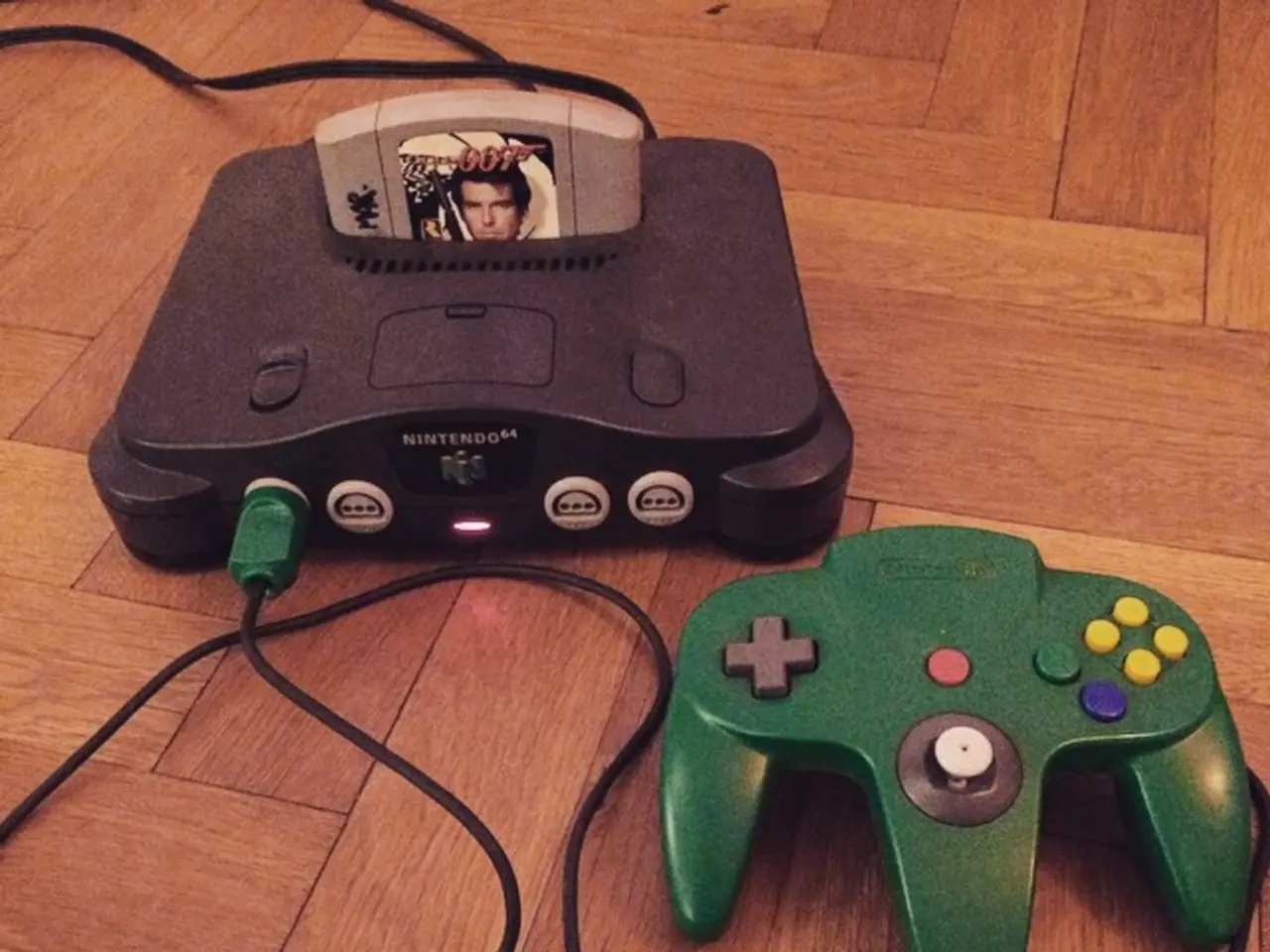Physical Games Rely on Integrity: Abandon Switch 2's Questionable Game-Key Cards to Preserve Traditional Gaming
In the world of gaming, the release of the Nintendo Switch 2 has sparked a debate around a new method of game distribution: game-key cards. These physical cards, while offering a unique twist on traditional cartridge-based gaming, have raised concerns about digital ownership, consumer rights, and game preservation.
Unlike traditional physical cartridges, game-key cards do not contain the full game data. Instead, they grant permission to download the game digitally. This ambiguity around ownership is a primary concern, as players must be online and insert the key card to play the downloaded game, blurring the line between owning a physical copy and purely digital ownership [1][2].
One of the key issues with game-key cards is their dependence on download and server availability. Since the key card is essentially a license, the game cannot be played if the digital version is removed from Nintendo's servers or if the player loses access to their Nintendo account. This raises concerns about long-term game preservation and archival [1][2].
Players have also expressed frustration with the inconvenience and confusion that comes with buying a physical key card that doesn't provide immediate access to the game itself but only a "key." This creates confusion and feels more restrictive than traditional cartridges, as digital licensing restrictions apply without the benefits of physical media [2][3].
Another concern is the limited cartridge sizes and issues faced by third-party publishers. Nintendo currently offers only 64GB cartridges, which do not accommodate very large games (some exceed 100GB). Third-party companies often opt for key cards due to size constraints and cost. However, this leads to a lack of a true physical product and may alienate consumers who prefer physical ownership or resale options [1][4][5].
Despite the backlash, Nintendo has acknowledged the community's concerns and is actively seeking feedback through surveys [2][3][5]. The survey went viral, with many expressing their dissatisfaction with the lack of physical game cards for Switch 2 games.
The Switch 2 has seen significant success, with Nintendo selling 8.67 million software units in the first seven weeks after the launch, most being the digital version of Mario Kart World [6]. However, the future of physical game cards on the Switch 2 remains uncertain.
Interestingly, Macronix, the company that made game cards for the original Switch, may be preparing to make game cards with varying capacities for the Switch 2 [7]. This could potentially address the size constraints and provide a more balanced solution between digital and physical ownership.
In conclusion, the game-key card system on the Nintendo Switch 2 raises fundamental questions about digital ownership versus physical ownership, complicates consumer rights to the games they purchase, and poses risks to game preservation. As the gaming industry continues to evolve, it will be interesting to see how Nintendo addresses these concerns and shapes the future of gaming on the Switch 2.
References:
- Nintendo's Digital-Only Future and the Death of Game Preservation
- Nintendo Switch 2 Game Cartridges: What You Need to Know
- Nintendo Switch 2: The Biggest Problems with Game-Key Cards
- Nintendo Switch 2's Game-Key Cards: A Step Backward for Gamers
- Nintendo Switch 2's Game-Key Cards: A Look at the Controversy
- Nintendo Switch 2 Sales: 8.67 Million Software Units Sold in First Seven Weeks
- Macronix to Make Game Cards for Nintendo Switch 2 with Varying Capacities
- Gizmodo has reported on the debate surrounding the new game-key card system introduced with the Nintendo Switch 2, highlighting concerns about digital ownership and long-term game preservation.
- Tech enthusiasts are questioning the future of technology and consumer rights, as the Sicario f^{[1]} game-key card system for the Switch 2 does not offer a traditional cartridge-based gaming experience.
- The ambiguity around ownership posed by game-key cards raises questions about the future of technology and game preservation, as players must be online to access downloaded games [2].
- In the realm of entertainment, the tech industry is witnessing a shift towards digital licensing with the rise of game-key cards, causing concerns about responsible gambling and digital ownership [3].
- Social media platforms are buzzing with discussions about big-wins from casino-and-gambling websites, showing a growing interest in online gambling trends [3].
- The popularity of casino-games and lotteries on online platforms highlights the need for responsible gambling policies and regulations [3].
- In the tech industry, debates continue on the role of technology in the future of gambling, with sports betting, poker, and European leagues becoming increasingly popular online [3].
- As the future of technology unfolds, it's interesting to see how technology companies like Nintendo address concerns over digital ownership and consumer rights [4].
- The tech community is closely watching developments in sports, with football, Champions League, basketball, NCA, MLB, NHL, racing, Premier League, NBA, Grand Prix, horse racing, golf, and mixed-martial-arts creating a new wave of sports-betting and analysis [5].
- Gadget enthusiasts are eagerly awaiting advancements in technology, such as improving weather-forecasting techniques and creating innovative sports-analysis tools [6].
- The future of casinos may look drastically different as technology continues to evolve, with auto-racing and horse racing becoming more digital [6].
- In response to community feedback, Nintendo is working to address concerns about the game-key card system on the Switch 2, raising hopes for a more balanced solution [7].
- Pundits and experts are analyzing the impact of the game-key card system on the future of the gaming industry, as it moves towards a digital-first approach [8].
- The newfangled game-key card system for the Nintendo Switch 2 has sparked fierce discussions among tech aficionados about its implications, obscuring the boundary between physical and digital ownership [8].
- The sports world is eagerly embracing technology to improve the gaming experience, introducing more immersive virtual reality and augmented reality features [9].
- The rise of eSports and online gaming has made tech companies more competitive, with big-players like Nintendo, Sony, and Microsoft vying for market shares [10].
- As the line between physical and digital ownership blurs, it'll be crucial for tech companies to address concerns about game preservation, consumer rights, and piracy [11].
- The tech industry must work together to promote a responsible and ethical approach to gaming, emphasizing consumer rights, transparency, and advocacy for responsible gambling [12].
- Technology continues to reshape our world, from entertainment (books, movies, music) to communication, work, and even gaming (smartphones, virtual reality headsets, console-games, and mobile-games) [13].
- In the age of technology, it's essential to understand how it affects our daily lives, as pastimes like casino-games, sports-betting, horse racing, and weather-forecasting become increasingly digitalized [13].




